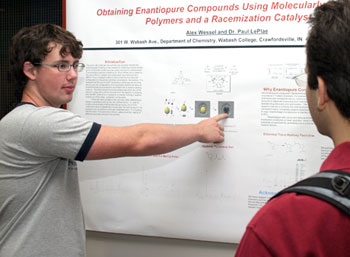Alex Nolan admits that spending eights weeks in the lab can have less-than-scintillating moments.
"Working in such detail and so focused can get monotonous at times," the sophomore chemistry major said. "But when I finally get that reaction I’ve been looking for, it brings joy to me."
 Alex Wessel ’08 enjoyed similar "Eureka" moments. "The process can be slow, but to actually discover something new is exciting — it’s worth the work."
Alex Wessel ’08 enjoyed similar "Eureka" moments. "The process can be slow, but to actually discover something new is exciting — it’s worth the work."
Nolan and Wessel were two of eight Wabash student interns who conducted research alongside Wabash chemistry professors Paul LaPlae and Lon Porter over the summer and presented the results of that work during a poster session at the Hays Science Hall Sept. 6.
LePlae’s research has potential implications in the pharmaceutical field, and Professor Porter’s work in nanotechnology seeks ways of delivering precisely controlled doses medication such as insulin to patients over long periods of time using implanted silicon computer chips.
Sophomore Trayton White said the learning curve on Porter’s research was steep, but the work was rewarding.
"I’m planning to attend medical school, so this research was especially meaningful to me," White said. "Twenty years down the road I may be a doctor when this process comes into use, and I’ll have inside knowledge on the process for my patients."
"The students’ results this summer were very exciting," Porter said of the work of White, Benjamin Edquist ’08, Steven Rhodes ’08, and Syud M. Ahmed ’06. Building on the work of Porter’s interns of last year, they "learned what had been done, then tinkered with it and reproduced even stronger results."
Porter and LaPlae believe that doing that sort of cutting edge research is essential to the education of young scientists
"They’re creating new knowledge," Porter said. "The lab is a different mode of inquiry; they’re the first to see this substance, these results—and it really sticks with them.
"They also learn that improvising and troubleshooting are a large part of science," he adds. "Sometimes you can learn as much chemistry with a wrench as with a beaker — inventing or making an apparatus you need to complete an experiment. Tinkering with an experiment and making it their own, they see that science is a dynamic and human process — always advancing — and they’re part of moving that forward."
The internships were funded by the chemistry department, the Byron K. Trippet Summer Research Fund, the Haines Fund, and the Englehardt Startup Fund.
Charles is Wabash Magazine editor.